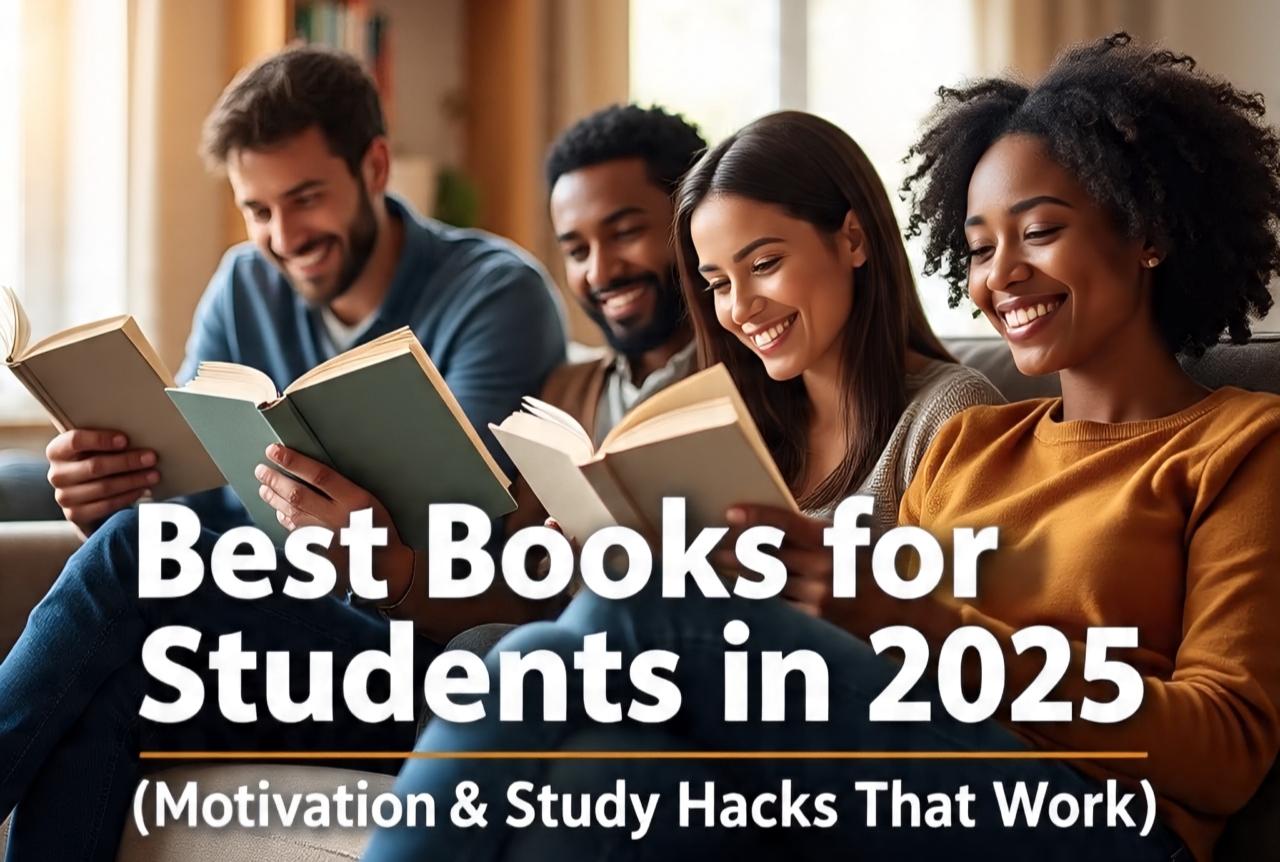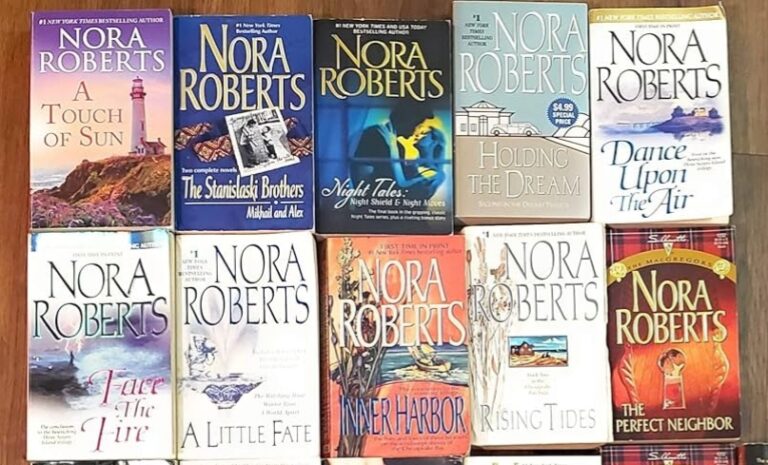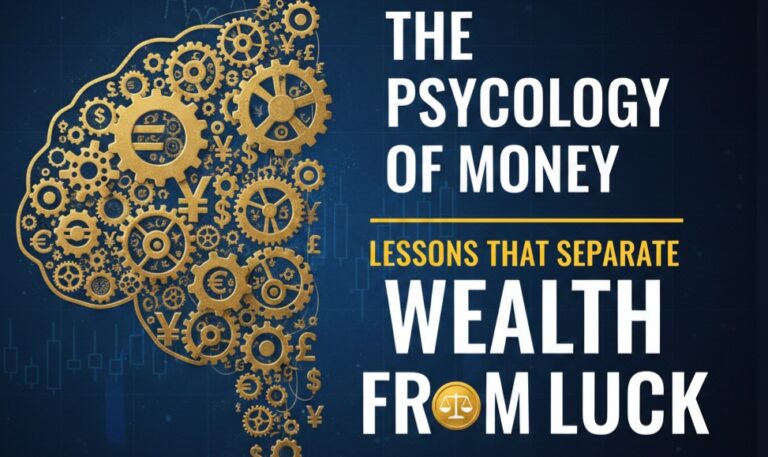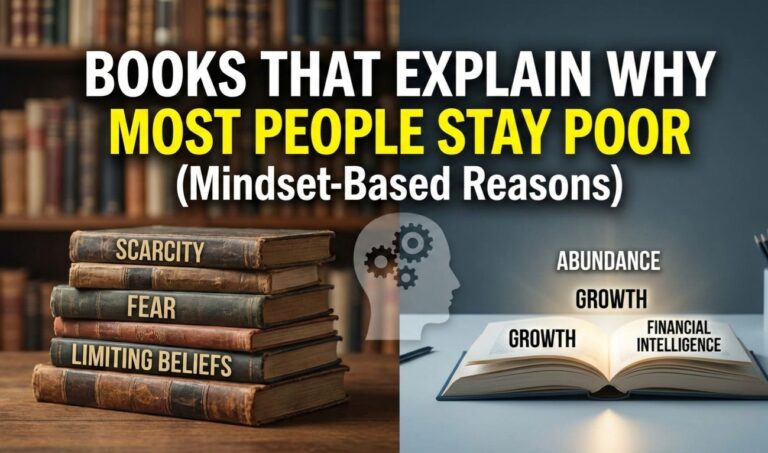In an era dominated by AI tutors, YouTube explainers, and bite-sized content on TikTok, one might assume that books have lost their relevance for students.

The reality, however, is the opposite. Books remain timeless tools for deep learning, critical thinking, and sustainable motivation. Unlike fleeting social media advice, the best student-focused books in 2025 provide tested frameworks and evergreen strategies to master productivity, mindset, and effective study habits.
From James Clear’s micro-habits to Cal Newport’s deep focus, these books empower learners to beat procrastination, retain knowledge longer, and stay motivated in competitive environments. This article curates the top 7 books for students in 2025, backed by expert insights, scientific research, and publishing trends.
Whether you’re a high schooler preparing for board exams, a college student balancing part-time work, or a lifelong learner pursuing certifications, these books will help you study smarter—not just harder.
Criteria for Selection
When curating this list, we avoided “trendy” books that fade after a season. Instead, the following benchmarks guided our picks:
- Relevance in 2025 – Each book addresses modern student challenges (digital distraction, remote learning, exam stress).
- Scientific or Expert Backing – Books rooted in psychology, neuroscience, or proven case studies.
- Practical Application – Lessons that can be applied immediately to academic life.
- Student Accessibility – Clear writing style, with tools adaptable for teenagers, undergraduates, and postgraduates alike.
- Critical Reception & Longevity – Books that continue to receive positive reviews from educators, psychologists, and readers globally.
Detailed List of Best Books for Students in 2025
1. Atomic Habits by James Clear
Author Background: James Clear, a productivity and habits expert, has been featured in The New York Times, Time, and Forbes. Since its release in 2018, Atomic Habits has sold over 15 million copies worldwide (Penguin Random House, 2025).
Why It Matters in 2025:
Students face unprecedented digital distractions—from social media notifications to AI chatbots. Atomic Habits remains a cornerstone because it emphasizes small, consistent actions that create massive long-term success.
Key Lessons:
- Habit Stacking: Attach new habits to existing routines (e.g., review flashcards after brushing teeth).
- Environment Design: Organize study spaces to reduce distractions.
- 1% Rule: Small improvements daily compound into remarkable academic gains.
Who Should Read:
- Students struggling with procrastination.
- Learners who fail to stick with study routines.
Pros:
Clear, science-backed strategies.
Relatable examples for students.
Works for both academic and personal growth.
Cons:
Can feel repetitive.
Some students expect instant results, but habits require time.
Expert Opinion:
“Clear’s framework is one of the most practical for students who want to create lasting study routines.” — Angela Duckworth, psychologist and author of Grit
Comparison:
Compared to Duhigg’s The Power of Habit, Clear’s book is simpler, more actionable, and particularly effective for students.
2. Deep Work by Cal Newport
Author Background: Cal Newport is a computer science professor at Georgetown University and author of several productivity bestsellers. His TED Talk on digital minimalism has been viewed by millions.
Why It Matters in 2025:
With remote learning and AI tools, students are multitasking more than ever. Newport argues that deep, focused work is the ultimate competitive advantage in a distracted world.
Key Lessons:
- Time Blocking: Schedule specific study hours with no multitasking.
- Digital Detox: Limit social media for focus.
- Craftsmanship Mindset: Value quality over quantity in academic output.
Who Should Read:
- University students working on dissertations or research.
- Competitive exam aspirants.
Pros:
Research-driven strategies.
Ideal for long study sessions.
Encourages discipline.
Cons:
Less motivational, more academic.
May intimidate casual readers.
Comparison:
Where Atomic Habits helps build routines, Deep Work teaches how to focus intensely once the habit is formed.
3. The 5 AM Club by Robin Sharma
Author Background: Robin Sharma is a Canadian leadership coach known for The Monk Who Sold His Ferrari. His books have been translated into 92 languages.
Why It Matters in 2025:
Flexible schedules often lead students to wake late and study at odd hours, reducing productivity. Sharma’s morning-routine philosophy helps reclaim structure.
Key Lessons:
- The 20/20/20 Formula: 20 minutes of exercise, 20 minutes reflection, 20 minutes growth.
- Morning time = peak mental clarity.
- Discipline and consistency breed excellence.
Who Should Read:
- Students struggling with irregular sleep patterns.
- Learners needing structure in hybrid or online classes.
Pros:
Motivational storytelling.
Holistic—mind, body, spirit balance.
Cons:
Less scientific, more inspirational.
Doesn’t work well for night owls.
4. Make It Stick by Peter C. Brown, Henry L. Roediger III & Mark A. McDaniel
Author Background: Co-authored by a novelist and two cognitive scientists, this book bridges psychology with practical learning hacks.
Why It Matters in 2025:
Despite online learning tools, students still fall into ineffective study habits like re-reading notes. Make It Stick introduces evidence-based learning techniques proven to improve retention.
Key Lessons:
- Retrieval Practice is more effective than passive review.
- Spaced Repetition trumps cramming.
- Difficulty signals learning—struggle improves retention.
Who Should Read:
- Students preparing for standardized tests.
- Lifelong learners needing efficient study techniques.
Pros:
Backed by rigorous cognitive science.
Practical for exam prep.
Cons:
Dry academic tone.
Less motivational.
5. Mindset by Carol S. Dweck
Author Background: Carol Dweck, a Stanford psychologist, is renowned for her research on achievement and motivation.
Why It Matters in 2025:
Many students face performance anxiety and imposter syndrome. Dweck’s growth mindset framework empowers them to embrace challenges and learn from failure.
Key Lessons:
- Fixed vs. Growth mindset.
- Effort and persistence beat talent.
- Failures are stepping stones.
Who Should Read:
- Students struggling with confidence.
- Parents/teachers guiding students.
Pros:
Evidence-backed psychology.
Empowering message.
Cons:
Case studies feel dated.
Simplified examples.
Publishing Trend Note:
Growth mindset interventions are now part of school curricula across the US, UK, and India (APA, 2024).
6. Limitless by Jim Kwik
Author Background: Jim Kwik, a brain performance coach, has trained Google, SpaceX, and Harvard students.
Why It Matters in 2025:
In the era of information overload, Kwik teaches students to read faster, remember better, and learn smarter.
Key Lessons:
- Speed-reading and note-taking strategies.
- Brain nutrition and sleep impact learning.
- Meta-learning: learn how to learn.
Who Should Read:
- Students overwhelmed with heavy reading.
- Learners preparing for knowledge-intensive exams.
Pros:
Engaging, hands-on exercises.
Covers lifestyle + study techniques.
Cons:
Self-promotional at times.
Not all hacks work for everyone.
7. The Pomodoro Technique by Francesco Cirillo
Author Background: Cirillo developed the Pomodoro system as a student in the 1980s. Today, it’s a global productivity movement.
Why It Matters in 2025:
Students with shorter attention spans benefit from the 25-minute work, 5-minute break cycle.
Key Lessons:
- Short bursts of focus enhance productivity.
- Breaks refresh the brain.
- Tracking tasks builds motivation.
Who Should Read:
- Procrastinators.
- Students with ADHD.
Pros:
Simple and universal.
Easy to implement immediately.
Cons:
Not ideal for deep research.
Can feel rigid for creative tasks.
Expert Commentary & Publishing Trends
- Educational Psychologists (APA, 2024): Growth mindset and retrieval practice remain the most effective interventions for student success.
- Publishing Insights (Penguin Random House, 2025): Study-skills and productivity titles are among the fastest-growing nonfiction categories, especially in India and Southeast Asia.
- Digital Trends: Audiobooks and Kindle editions dominate student readership, with Audible reporting a 40% rise in student subscriptions since 2022.
FAQs
1. Which book is best for beginners?
Atomic Habits—simple, practical, easy to implement.
2. Which book is best for competitive exams?
Make It Stick and Limitless—both focus on memory and retention.
3. Which book helps with focus?
Deep Work is the ultimate manual for concentration.
4. Which book is best for motivation?
The 5 AM Club and Mindset.
5. Which is the shortest, most practical read?
The Pomodoro Technique.
6. Should I read them all?
No—pick based on your current struggle (habits, focus, mindset, study technique).
7. Are they available in audiobook?
Yes, all are available on Audible, Scribd, and Google Play Books.
Conclusion: Which Book Will You Pick First?
The best books for students in 2025 go beyond generic motivation—they deliver science-backed study hacks, timeless psychological insights, and practical frameworks.
- For procrastination, start with Atomic Habits.
- For focus, read Deep Work.
- For exam prep, rely on Make It Stick or Limitless.
- For confidence, choose Mindset.
👉 The next step is yours: Which of these books will you open first to supercharge your academic journey in 2025?
For related guides, check out:
- Top 15 Best Books to Read in 2025
- Top 5 Cal Newport Books
- 10 Best Self-Help Books That Will Actually Improve Your Life
Thank you for reading!
Stay tuned for more inspiring Books summary, Author spotlight, Trend Books & more get full information on TheBooksx.com





